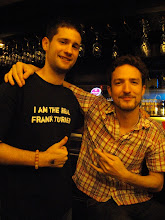I have recently written a paper dealing with protectionism and the dangers it poses to the United States and the rest of the world. I will be posting it in revised sections the next few days and would enjoy feedback that you might have for me.
-----
Great challenges lie ahead for the United States: Ways in how we fight terrorism domestically and internationally, the United States' affect on global warming, substitutes for fossil fuels, and rising international powers and superpowers. With these great challenges lying ahead, there is one that is currently more pressing. This great challenge facing the United States is in the area of international finance: specifically the war between free-trade and protectionism.
When the financial crisis began in August 2007, few realized the scope of what was to come. Almost overnight, credit markets dried up which resulted in banks cutting back or freezing their lending practices. This led to businesses and start ups not being able to receive loans for items ranging from payroll to expansion. The result then was a freeze in hiring and the beginning of layoffs, causing people to panic and stop spending. With consumers spending much less, this led companies into underperforming their sales estimates which resulted in the termination of hundreds of thousands of jobs. With hundreds of thousands of jobs being lost in the United States alone, the international markets began to feel the pain as many of their biggest consumer, the United States population, stopped spending on items ranging from the luxurious to upgrades. This has resulted in millions of jobs being lost in Europe and Asia. With the massive job losses have come a revival of an idea once thought dead: Protectionism.
How is this a threat to United States national security? The thesis is this: Protectionism will negatively affect trade and the international economy. If the world economy becomes unstable, it will cause international politics – international governments – to become unstable. This instability could lead to radicalization, even war, in both Asia and Europe in a short time period.
The idea of free-trade promoting peace comes from the German philosopher Emmanuel Kant. In short, he proclaimed a three-pronged plan to promote peace: Democracy, free-trade, and Democratic international organizations. This became known as Liberalism. I specifically want to look into why Kant believed free-trade promoted peace.
Kant claims that free-trade encourages open trading relationships. With more open trading, countries would lower and eventually eliminate tariffs – resulting in more exports to other countries to help sustain domestic manufacturing and business. Also, free-trade encourages movement of labor and capital, such as foreign direct investment or by the way the European Union allows member-states' citizens to move and work inside any member of the EU.
Continuing, conquest for resources is not necessary. Countries can now trade with one another for scarce or precious resources instead of using force to obtain those items. Finally, trade linkages means more contact with trading countries, which means greater understanding among those countries which in theory raises the cost of conflict.
Since Kant's birth of Liberalism, capitalism has gone through many evolutions. From laissez-faire to Wilsonian, capitalism has gone through fits and bouts in its evolution, but capitalism has always engendered crises, and always will. It is near impossible to separate Liberalism from capitalism, and vice versa – due to the fact that both emphasize individual rights and opportunity.
Liberalism, and it's beliefs, are held in high regard because of the belief that true Liberalism promotes peace. However, if trading relationships actually promote peace, does that mean lack of trading can promote conflict? The obvious answer to any question asked as an absolute is no. But generally speaking, it can be argued that lack of trading can promote conflicts to arise.

No comments:
Post a Comment